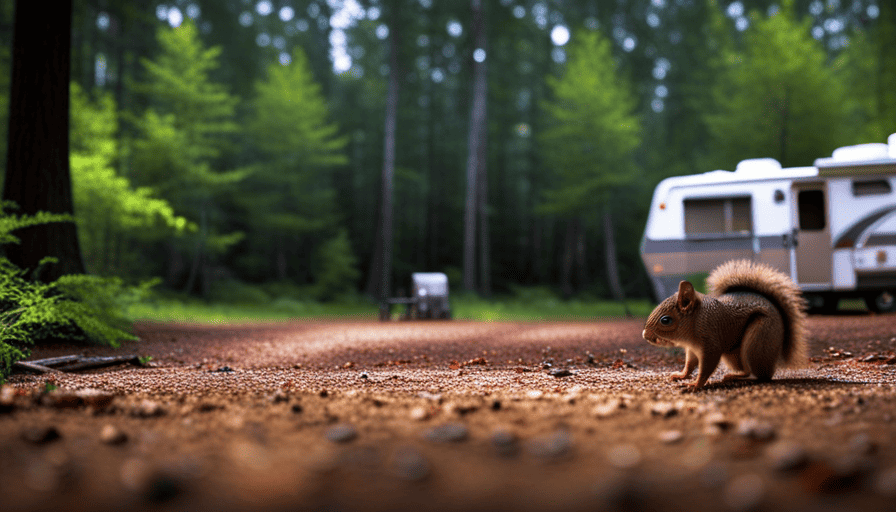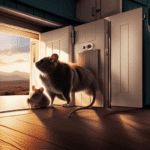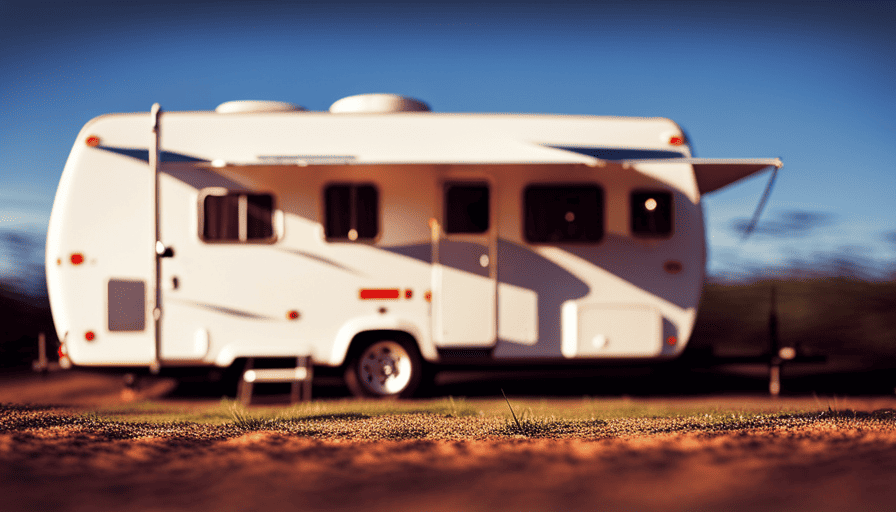Picture this: You’re out on a camping trip, enjoying the sights and sounds of nature, when suddenly, the peaceful atmosphere is shattered by the sound of scurrying and chattering. Looking up, you’re surprised to see a squirrel darting along the roof of your camper. It’s clear that you have an unexpected visitor, and if you don’t act quickly, your camper could soon become their cozy new home. But don’t fret—I have the knowledge and practical tips to keep those pesky squirrels from taking over your camper.
In this article, I will share with you the techniques and strategies to:
- Identify entry points
- Seal cracks and holes
- Remove food sources
- Use squirrel-proof containers
- Install mesh or wire screens
- Trim tree branches near the camper
- Use noise and motion-activated devices
- Set traps
- Regularly inspect and maintain your camper.
By following these steps, you can ensure that your camping experience remains squirrel-free, allowing you to fully enjoy the tranquility of the great outdoors without any unwanted furry guests.
So let’s dive in and learn how to keep those squirrels at bay!
Key Takeaways
- Identify and seal entry points such as loose vents, screens, gaps, holes, and cracks with steel wool or wire mesh.
- Remove potential food sources and use squirrel-resistant bird feeders to reduce squirrel attraction.
- Use natural repellents like peppermint oil or hot pepper flakes, as well as squirrel-proof containers to protect belongings.
- Implement a multi-faceted approach by installing mesh or wire screens on windows, vents, and openings, using repellents and deterrents, and maintaining the camper regularly.
Identify Entry Points
Let’s figure out where those sneaky squirrels are sneaking in! Preventive measures are key when it comes to keeping squirrels out of your camper. Understanding squirrel behavior is crucial in identifying the entry points they might use.
Squirrels are agile creatures and can fit through small openings, so it’s important to thoroughly inspect your camper for any potential access points. Check for loose or damaged vents, screens, or gaps around windows and doors. Additionally, pay attention to any holes or cracks in the exterior of your camper, as squirrels can chew through weak spots to gain entry.
Seal cracks and holes to ensure a squirrel-proof camper. Patch up any openings with durable materials like steel wool or wire mesh. It’s also a good idea to use weather stripping around windows and doors to create a tight seal. Don’t forget to inspect the undercarriage of your camper as well, as squirrels may try to enter from underneath.
By taking these preventive measures and securing all potential entry points, you can greatly reduce the chances of squirrels infiltrating your camper and causing damage. Now, let’s move on to the next section and learn how to seal cracks and holes effectively.
Seal Cracks and Holes
To effectively prevent squirrels from entering the camper, it’s important to seal any cracks and holes that could potentially serve as entry points. Sealing gaps and cracks is a crucial step in squirrel exclusion, as it denies them easy access to your camper. Here are a couple of reasons why this is important:
-
Protecting your camper’s insulation: Squirrels are notorious for chewing through insulation material, which can lead to costly repairs. By sealing cracks and holes, you not only keep squirrels out but also ensure the longevity of your camper’s insulation.
-
Preventing further damage: Squirrels are persistent creatures and will keep trying to find a way in if they sense there’s an entry point. By sealing all potential access points, you eliminate the risk of them causing damage to your camper’s interior or electrical wiring.
In addition to sealing cracks and holes, it’s essential to remove any potential food sources that might attract squirrels. By denying them food, you reduce the chances of them attempting to enter your camper. So let’s move on to the next section where we’ll discuss how to remove these tempting food sources.
Remove Food Sources
Removing potential food sources is like taking candy away from a child – it’s a necessary step to prevent squirrels from being tempted to enter your camper. Squirrels are notorious for their ability to sniff out even the smallest morsel of food, so it’s crucial to eliminate any attractants that may entice them.
One effective way to do this is by using squirrel-resistant bird feeders. These feeders are designed with mechanisms that prevent squirrels from accessing the birdseed, ensuring that the food remains solely for the birds.
Additionally, consider using natural squirrel repellents around your camper. Squirrels are deterred by strong scents such as peppermint oil or hot pepper flakes. Apply these repellents around the exterior of your camper and near any potential entry points to create a barrier that squirrels will want to avoid.
By removing food sources and using squirrel-resistant bird feeders and natural repellents, you significantly reduce the likelihood of squirrels invading your camper.
In the next section, we will discuss the importance of using squirrel-proof containers to further safeguard your camper from these persistent critters.
Use Squirrel-Proof Containers
Using squirrel-proof containers is essential for protecting your precious belongings from being ransacked by these persistent little thieves. Here are four items to consider when choosing squirrel-proof containers:
-
Squirrel-proof feeders: Invest in feeders specifically designed to keep squirrels out. These feeders often have mechanisms that close off access to the food when a squirrel tries to get in. Look for feeders with weight-sensitive perches that only allow smaller birds to feed.
-
Electronic repellent devices: These devices emit high-frequency sounds that are irritating to squirrels, making them want to stay away. Place these devices strategically around your camper to create a deterrent barrier.
-
Airtight containers: Store your food and other belongings in airtight containers to prevent squirrels from smelling them. Squirrels have a keen sense of smell and can easily detect food, prompting them to go on a scavenging mission.
-
Chew-proof containers: Squirrels are notorious chewers, so opt for containers made of sturdy materials like metal or heavy-duty plastic. Avoid using containers made of materials like wood or thin plastic, as squirrels can easily gnaw through them.
By using squirrel-proof containers, you can effectively keep these pesky critters at bay and safeguard your camper.
In the next section, we’ll discuss another effective method to keep squirrels out: installing mesh or wire screens.
Install Mesh or Wire Screens
Installing mesh or wire screens is a foolproof way to fortify your camper against the relentless invasion of these crafty critters. Not only do these screens keep squirrels out, but they also provide proper ventilation, ensuring a comfortable and breathable environment inside your camper.
When choosing screens, make sure they’re made of durable materials that can withstand the squirrels’ sharp teeth and determined efforts to get in. Additionally, opt for screens with small enough gaps to prevent even the smallest squirrel from squeezing through.
Mesh or wire screens can be installed on windows, vents, and other openings that squirrels might use to gain access to your camper. By securing these vulnerable areas, you’re taking important camper security measures. Squirrels will be discouraged from attempting to enter, knowing that your camper is well-protected.
As you move forward in your quest to keep squirrels out of your camper, the next step is to explore the use of repellents and deterrents. These additional measures will further reinforce your camper’s defense against these persistent pests.
Use Repellents and Deterrents
In order to effectively ward off those pesky critters, it’s high time we consider implementing repellents and deterrents in our camper. Squirrels can be persistent and resourceful, so it’s important to have a multi-faceted approach to keep them away.
Here are three effective methods to consider:
-
Natural alternatives: One option is to use natural squirrel repellents, such as peppermint oil or vinegar. Squirrels have a strong sense of smell, and these scents can deter them from entering your camper.
-
DIY squirrel repellents: Another option is to create your own squirrel repellents using ingredients you may already have at home. For example, mixing cayenne pepper with water and spraying it around your camper can be an effective deterrent.
-
Mesh or wire screens: In addition to using repellents, installing mesh or wire screens on openings, such as vents or windows, can help keep squirrels out. These screens act as a physical barrier, preventing them from entering your camper.
By utilizing these natural alternatives and DIY squirrel repellents, along with installing mesh or wire screens, you can greatly reduce the chances of squirrels infiltrating your camper. However, there’s one more important step to take in order to fully squirrel-proof your camper: trimming tree branches near the camper.
Trim Tree Branches Near the Camper
To further prevent squirrels from infiltrating your camper, another effective strategy is to trim tree branches near the camper. By pruning branches that hang over or near your camper, you can eliminate potential pathways for squirrels to access your vehicle.
Squirrels are agile climbers and can easily jump from branches to your camper, so it’s crucial to keep these pathways trimmed and inaccessible. When trimming branches, make sure to cut them back at least six to eight feet away from your camper. This distance will create a sufficient barrier and discourage squirrels from attempting to reach your vehicle.
Additionally, it’s essential to consider the proximity of bird feeders to your camper. Squirrels are attracted to bird feeders and will often use them as a food source. If possible, relocate bird feeders away from your camper to minimize squirrel activity near your vehicle.
By taking proactive measures to prune tree branches and relocate bird feeders, you can significantly reduce the likelihood of squirrels invading your camper. These simple steps will create a physical barrier and deter squirrels from accessing your vehicle.
In the next section, we’ll explore the use of noise and motion-activated devices to further enhance squirrel prevention.
Use Noise and Motion-Activated Devices
By using noise and motion-activated devices, you can create a lively and dynamic environment around your camper that deters unwanted furry visitors. These alternative methods are highly effective in keeping squirrels at bay. The key is to disrupt their normal behavior and make them feel uncomfortable in your camper’s vicinity.
Behavioral modifications play a crucial role in deterring squirrels. These devices emit loud sounds and sudden movements, mimicking the presence of predators. Squirrels are naturally cautious creatures, and such disruptions make them wary of approaching your camper. The noise and motion-activated devices can be strategically placed around your camper, ensuring maximum coverage. They’re designed to activate when squirrels come within a certain range, startling them and encouraging them to seek shelter elsewhere.
With these devices in place, you can rest assured that your camper is protected from these pesky critters. However, it’s important to note that noise and motion-activated devices are just one part of a comprehensive squirrel prevention plan. In the next section, we’ll discuss the importance of setting traps to further reinforce your defense against these persistent squirrels.
Transitioning into the subsequent section about setting traps, it’s essential to have a multi-faceted approach to squirrel prevention.
Set Traps
Trapping those pesky critters is like playing a never-ending game of hide-and-seek, where the squirrels are the masters of deception. When it comes to keeping squirrels out of your camper, setting traps can be an effective method.
There are various types of traps available, such as live traps and snap traps, but it’s important to check your local regulations before using them. Once you catch a squirrel, it’s best to relocate it far away from your camper, ensuring it won’t find its way back.
In addition to trapping, there are natural squirrel deterrents that can help keep them away from your camper. Squirrels dislike strong smells, so you can try placing mothballs or peppermint-soaked cotton balls near potential entry points. Another option is using predator urine, like that of foxes or coyotes, as squirrels are afraid of these animals.
By combining trapping and natural deterrents, you can significantly reduce the presence of squirrels in your camper. However, it’s important to regularly inspect and maintain the camper to minimize any potential entry points. Check for gaps or holes in the exterior, and seal them off with steel wool or caulk. Additionally, make sure all windows and vents are properly screened to prevent squirrels from getting in.
Regularly Inspect and Maintain the Camper
Now that we’ve discussed setting traps as a method to keep squirrels out of your camper, let’s move on to the next important step: regularly inspecting and maintaining the camper. As an experienced camper owner, I can’t stress enough how crucial this is in preventing squirrel infestations.
First and foremost, it’s important to inspect the ventilation systems of your camper. Squirrels are notorious for squeezing through small openings, so make sure all vents are securely covered with mesh or wire. Regularly check for any signs of damage or wear and promptly repair or replace them if needed.
Additionally, don’t forget to check the electrical wiring of your camper. Squirrels have a knack for chewing on wires, which can not only damage your electrical system but also pose a significant fire hazard. Inspect the wiring for any signs of gnawing or fraying and address any issues immediately.
Lastly, take the time to inspect the exterior of your camper for any potential access points. Look for gaps or holes in the walls, windows, or doors and seal them properly. Remember, prevention is key when it comes to keeping squirrels out of your camper, so stay vigilant and address any vulnerabilities promptly.
By regularly inspecting and maintaining your camper, specifically checking the ventilation and electrical systems, you can greatly reduce the risk of squirrel infestations and enjoy a pest-free camping experience.
Frequently Asked Questions
How do I attract squirrels to my camper?
To attract squirrels to your camper and create a squirrel-friendly environment, there are a few steps you can take.
First, provide a variety of food sources such as nuts, seeds, and fruits in designated feeding areas.
Plant trees and shrubs that produce nuts to attract them.
Add squirrel-friendly features like a water source, nesting boxes, and climbing structures.
By creating an enticing habitat, you’ll have a better chance of attracting these playful critters to your camper.
What type of repellent should I use to keep squirrels away?
To keep squirrels away, I recommend using natural deterrents that are effective in repelling them. One option is to use strong-smelling substances like peppermint oil, vinegar, or ammonia, as squirrels dislike these scents.
You can also try using motion-activated devices that emit high-frequency sounds or flashes of light, which can startle and deter squirrels.
Additionally, placing mesh or wire barriers around potential entry points can help prevent them from entering your camper.
Can I use traps to catch and relocate squirrels?
Yes, you can use relocation traps to catch and relocate squirrels. However, there are ethical considerations to keep in mind. When using traps, it’s important to ensure that they’re humane and don’t harm the squirrels. Additionally, it’s crucial to release them in a suitable environment where they can thrive.
Remember to check local regulations and consult with professionals to ensure that you’re following the proper procedures for trapping and relocating squirrels.
How often should I inspect and maintain my camper for squirrel entry points?
Regular inspections are crucial to prevent pesky pests like squirrels from infiltrating your beloved camper. It’s imperative to stay vigilant and inspect your camper frequently to identify potential entry points.
Common areas where these critters gain access include vents, gaps in doors or windows, and damaged screens. To effectively seal these openings, utilize durable materials like steel wool or wire mesh.
By conducting routine inspections, you’ll ensure your camper remains squirrel-free and ready for your next adventure.
Are there any specific types of noise or motion-activated devices that are more effective in deterring squirrels?
Noise-activated and motion-activated devices can be effective in deterring squirrels. When it comes to noise-activated devices, I’ve found that ultrasonic repellents work well. These emit high-frequency sounds that are unpleasant to squirrels, but inaudible to humans.
As for motion-activated devices, I recommend using sprinklers or lights. The sudden burst of water or the bright light can startle squirrels and make them think twice about entering your camper.
Remember to strategically place these devices near potential entry points for the best results.
Are the Methods for Keeping Squirrels Out of a Camper Similar to Keeping Spiders Out?
Keeping spiders away in a camper involves sealing gaps, using natural deterrents like essential oils, and regular cleaning. While methods differ, addressing entrances, employing repellents, and cleanliness are shared strategies. Vigilance in blocking squirrel entry points is crucial to prevent gnawing damage, but dissimilar to spider prevention techniques. The goal remains consistent: maintaining a critter-free camping environment.
Conclusion
So there you have it, folks! By following these simple yet effective steps, you can keep those pesky squirrels out of your camper once and for all.
Seal up those cracks and holes, remove any tempting food sources, and invest in some squirrel-proof containers. Don’t forget to install mesh or wire screens and trim those tree branches near your camper.
And for an extra layer of protection, try using noise and motion-activated devices. With these tips in your arsenal, you’ll be able to enjoy your camping trips without any furry intruders. Happy camping!



















